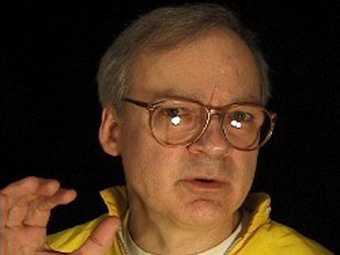
Tony Oursler, Synesthesia: Tony Conrad 1997–2001
This free screening presents two works featuring artist, filmmaker and musician Tony Conrad, who collaborated with Tony Oursler on the soundtrack for The Influence Machine.
Sound Digressions in Seven Colors
Tony Oursler, USA 2006, colour, sound, 12 min 59
Oursler's long-time exploration of sound and music has led to numerous collaborations with acclaimed musicians and sound artists. Sound Digressions in Seven Colors is the single-channel version of a multi-channel projection installation and features performances by Kim Gordon, Tony Conrad, Stephen Vitiello, and Ikue Mori, amongst others. The original installation, exhibited at Nyehaus in New York in 2006, was the culmination of several projects that Oursler had been experimenting with for many years. Oursler first became engaged with the idea of a perpetually changing piece of music while at CalArts and attending lectures by John Cage. For this project, seven performers were recorded and then recombined in an installation setting, in an experiment with chance recombination. The performers were not told what the others would play, only that they would be mixed with six other players. In this way, an ‘exquisite corpse’ was developed between the players. The single-channel version is a layered sound and image collage of the seven performances, each assigned a specific color. With Tony Conrad, Kim Gordon, Ikue Mori, Lee Renaldo, Zeena Parkins, J.G. Thirwell, Stephen Vitiello.
Synesthesia: Tony Conrad
Tony Oursler, USA 1997–2001, colour, sound, 45 min 19
Tony Oursler's Synesthesia project features interviews with twelve legendary figures in the downtown music, performance and art scenes: John Cale, Thurston Moore, Dan Graham, Genesis P-Orridge, Kim Gordon, Glenn Branca, Laurie Anderson, Tony Conrad, David Byrne, Lydia Lunch, Alan Vega, and Arto Lindsay. Originally included as one element of Oursler and Mike Kelley's multimedia installation The Poetics Project, these conversations reveal fascinating insights and anecdotes from some of the most influential figures in the experimental rock and art underground of the 1970s and '80s, from pre-punk innovators to post-punk icons, from industrial and avant-garde music to noise bands and ‘no wave’.
Since the 1960s, Tony Conrad's experimental work has helped define the contours of minimalism, both in music and in film. Even as films such as The Flicker upped the ante of structuralist filmmaking, he was crafting a body of musical work that stands as a major achievement of experimental composition, from long-duration performances with LaMonte Young and John Cale as The Theater of Eternal Music to his more pop-oriented work with the German art-rock band Faust.
Tate Film is supported by Maja Hoffmann / LUMA Foundation
